Dell S2722QC monitor review: Affordable 4K and USB-C, with sacrifices

 Image: Matt Smith/IDG
Image: Matt Smith/IDGAt a glance
Pros
Uniquely affordable USB-C monitor4K resolution with HDR optionHigh brightness and good color accuracyIntegrated speakers
Cons
Low contrast ratio saps SDR vibranceMediocre color gamut
Our Verdict
The Dell S2722QC offers 4K, USB-C, HDR, and integrated speakers for a uniquely affordable price, but makes some image quality sacrifices to hit its low cost. It’s a good everyday productivity monitor that you should buy for its features, not its performance.
Price When Reviewed
$380
Best Prices Today: Dell S2722QC
RetailerPrice
 $299.99View Deal
$299.99View Deal
Want a USB-C monitor with 4K resolution? If so, you may be recovering from sticker shock. Monitors with this combination are rarely affordable.
Prices have come down in the past year, however, thanks to displays like the Dell S2722QC, which typically retails for $380. That’s only slightly more expensive than many mid-range 4K monitors.
That’s tempting if you want a convenient monitor that can connect to an ultraportable laptop over USB-C, but be warned: Dell’s obtainable monitor suffers a few setbacks to achieve its oh-so-compelling price.
Dell 27″ 4K USB-C monitor S2722QC specs and features
On paper, the Dell S2722QC delivers all the features I look for in a modern monitor. It has USB-C, as mentioned, and also packs plenty of ergonomic adjustments, a VESA mount, and built-in speakers. This adds versatility.
Display size: 27-inchNative resolution: 3,840 x 2,160Panel type: IPSRefresh rate: 60HzAdaptive Sync: AMD FreeSyncPorts: HDMI 2.0 (x2), USB-C (with DisplayPort and 65 watts Power Delivery), 2x USB-A 3.2 Gen 1Stand adjustment: 110mm height adjustment, 25 degrees tilt, 60 degrees swivel, 90 degree pivotVESA mount: Yes, 100mm x 100mmSpeakers: Yes, two 3-watt speakersPrice: $619.99 MSRP / $379.99 typical
Pricing sets the Dell S2722QC apart. It’s available for $379.99 on Dell.com and Amazon, undercutting typical pricing for monitors like the Samsung S80A, HP U28, and Asus ProArt line. These sell between $400 and $500.
Dell S2722QC design: Attractive, yet subtle
The Dell S2722QC has thin display bezels on three sides which are further obscured by an edge-to-edge screen surface that extends beyond the LCD panel and into the bezels. A small chin along the bottom provides space for the Dell logo and the monitor’s four menu buttons.
Around back you’ll find a matte gray textured plastic not unlike the faux carbon-fiber weave found on most Dell XPS laptops. It’s an attractive yet subtle design that sets the monitor apart from Acer, Asus, and HP. Odds are you don’t care much what your monitor looks like – but, if you do, the Dell is a favorite.
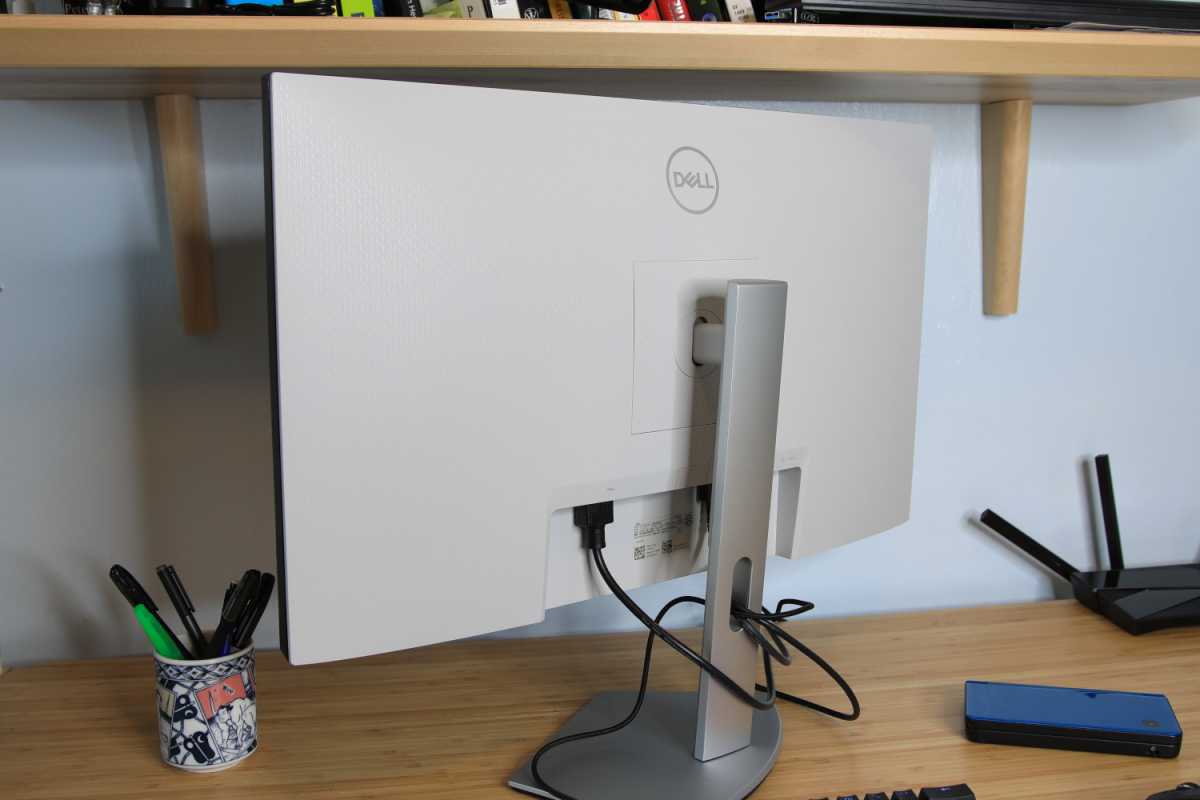
Matt Smith/IDG
Matt Smith/IDG
Matt Smith/IDG
The monitor ships with a versatile ergonomic stand that adjusts for height, tilt, swivel, and can pivot 90 degrees into portrait orientation. It attaches to a 100mm VESA mount, so third-party monitor arms are an option.
Dell S2722QC features: USB-C wins again
USB-C is the Dell S2722QC’s headline feature and the monitor’s core upgrade from its predecessor, the S2721QS. The new model adds a USB-C port with DisplayPort 1.4 and Power Delivery up to 65 watts. This makes it possible to connect and charge a laptop with a single USB-C cable. It’s a handy solution, and the S2722QC is among the least expensive 4K monitors with this feature.
You’ll find two USB-A 3.2 Gen 1 ports for connecting wired USB-A peripherals. Many competitive monitors offer this perk. Still, it’s good to see the S2722QC provides 3.2 Gen 1 speeds across both ports.
The USB-C port is joined by two HDMI 2.0 ports for a total of three input options. A standard DisplayPort input is missing, which may disappoint desktop owners used to connecting with that standard. You can still use standard DisplayPort, but only with a DisplayPort to USB-C adapter.
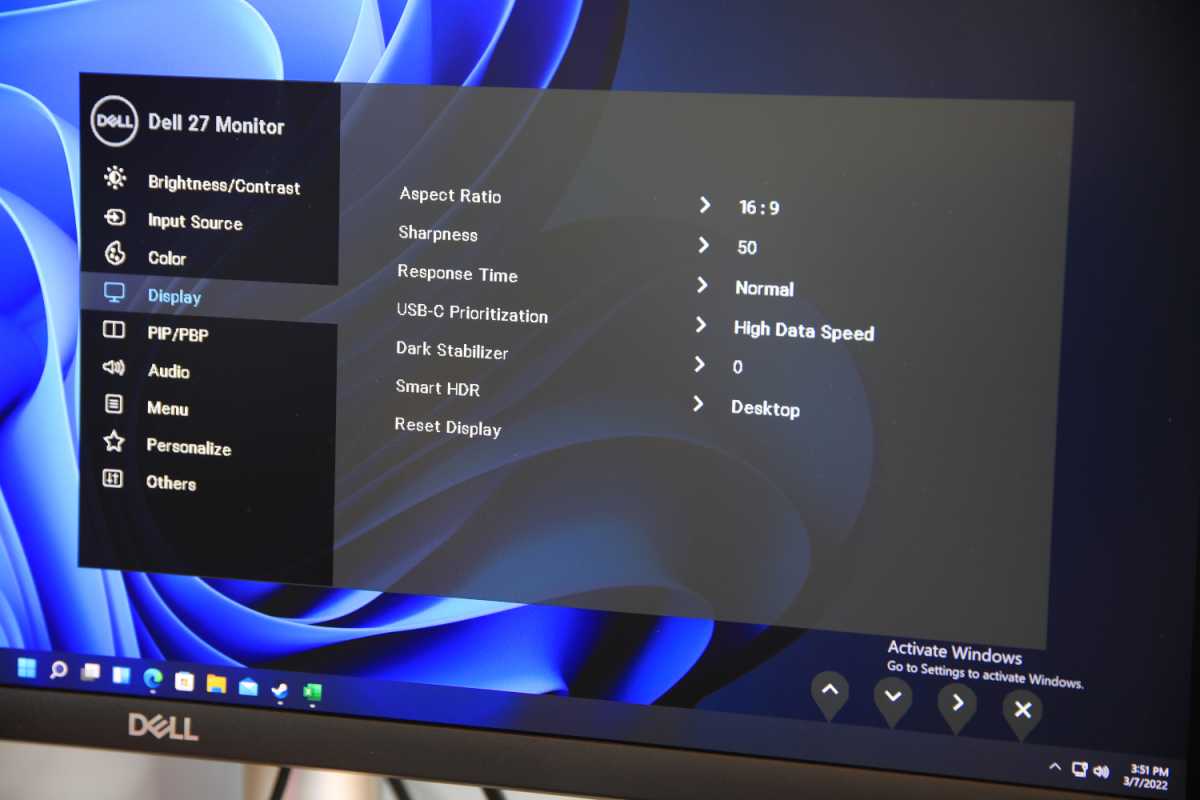
binary comment
binary comment
Matt Smith/IDG
binary comment
Matt Smith/IDG
Matt Smith/IDG
Image quality controls are minimal. There’s brightness, contrast, and sharpness, plus limited RGB color calibration available in the Custom Color display mode. Limited image quality control is not unusual in this price range but some competitors, like the Viewsonic VP-2K and Asus ProArt line, offer more options.
A pair of three-watt speakers round out the S2722QC’s features. They can handle basic operating system sounds, video conferences, and podcasts without issue. Music, movies, and games will push them beyond their limits and lead to muddy, unpleasant sound at higher volumes.
Dell S2722QC SDR display performance testing: Everything’s fine
The Dell S2722QC is attractive and has useful USB-C connectivity, but all that is for nothing if the monitor’s display quality is subpar. Let’s dig into it.
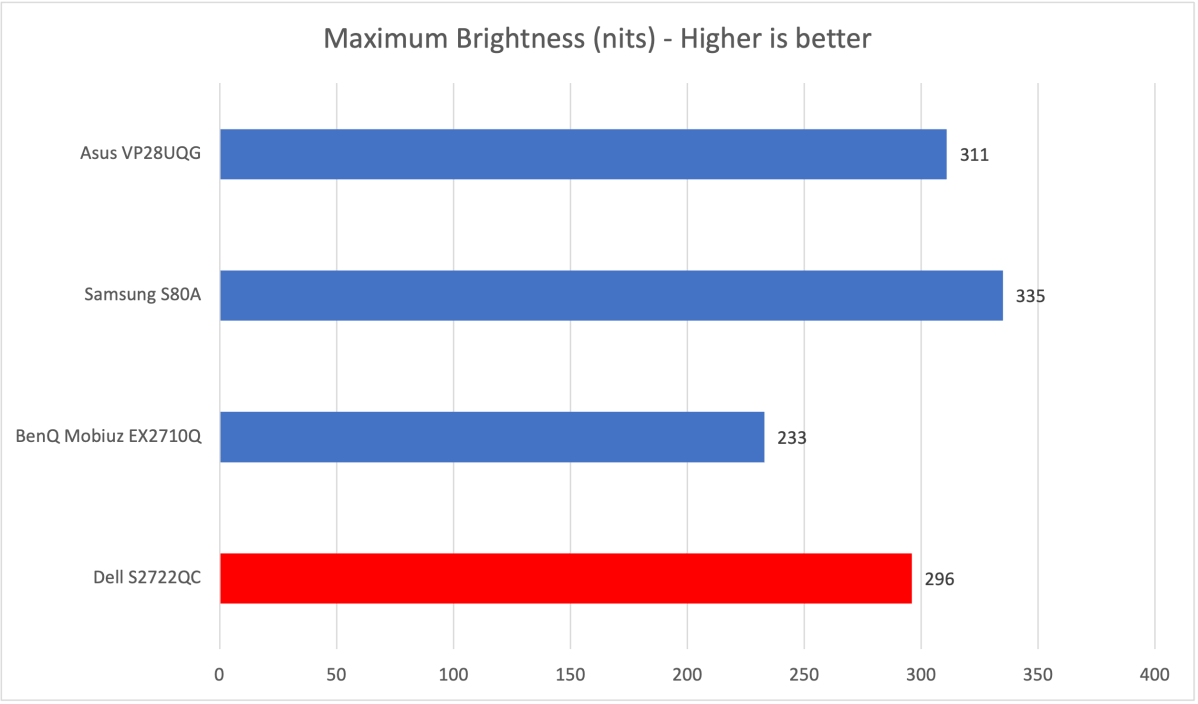
Matt Smith/IDG
Matt Smith/IDG
Matt Smith/IDG
I’ll start with SDR brightness, where the Dell S2722QC posts a respectable score of 296 nits. This may seem low next to the higher brightness of premium laptops and smartphones, but it’s more than adequate for a monitor (which is typically in a room with some light control) and in line with the competition.
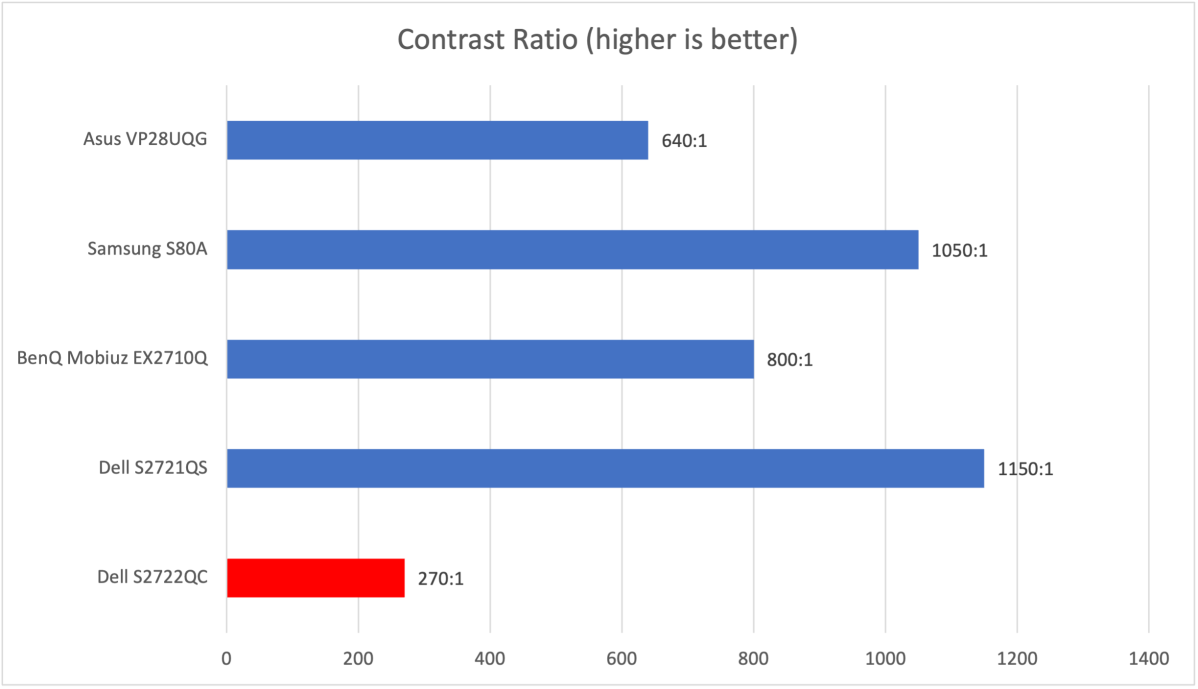
Matt Smith/IDG
Matt Smith/IDG
Matt Smith/IDG
SDR contrast, on the other hand, wallops the S2722QC with a lackluster contrast ratio of 270:1. I’ll dig into this more with the HDR results, which are different and dramatically better. Still, this shows Dell’s factory tuning of the S2722QC leaves a lot to be desired. The monitor looks flat and lifeless in SDR mode.
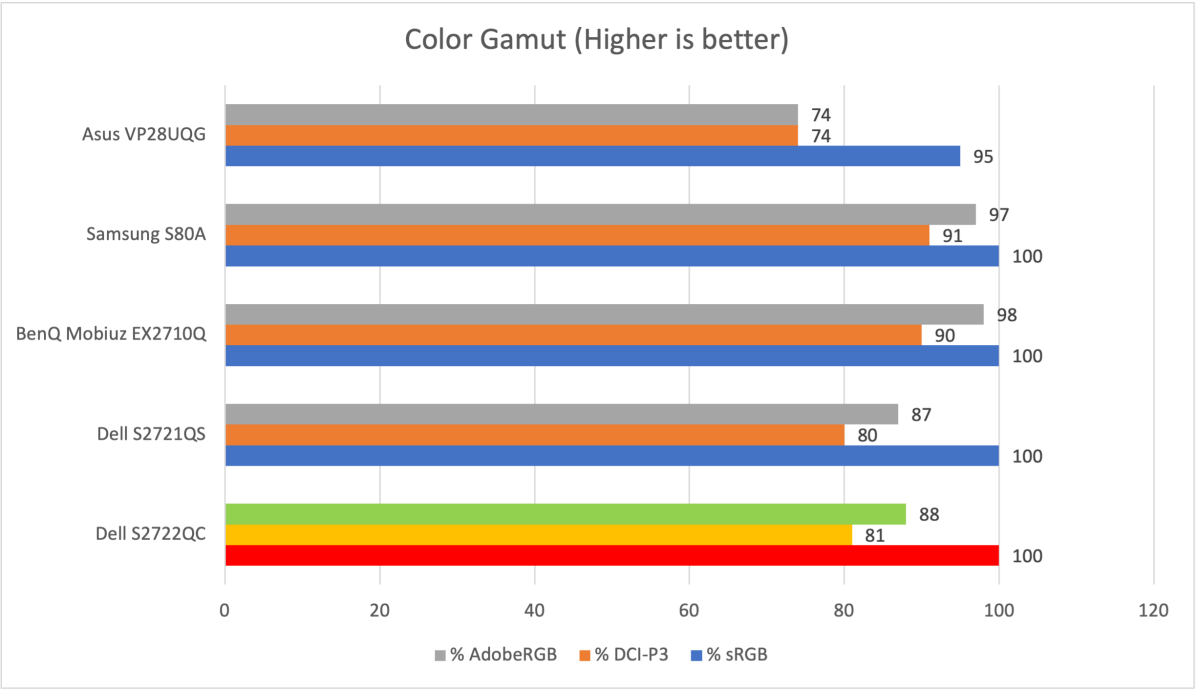
Matt Smith/IDG
Matt Smith/IDG
Matt Smith/IDG
The S2722QC can handle the full sRGB color gamut, which is typical for a monitor in its price range. It is not a wide color gamut monitor, however, as it can only support 88 percent of the DCI-P3 color gamut. Put simply, the S2722QC can display a relatively narrow range of color. Samsung’s S80A takes a clear lead here.
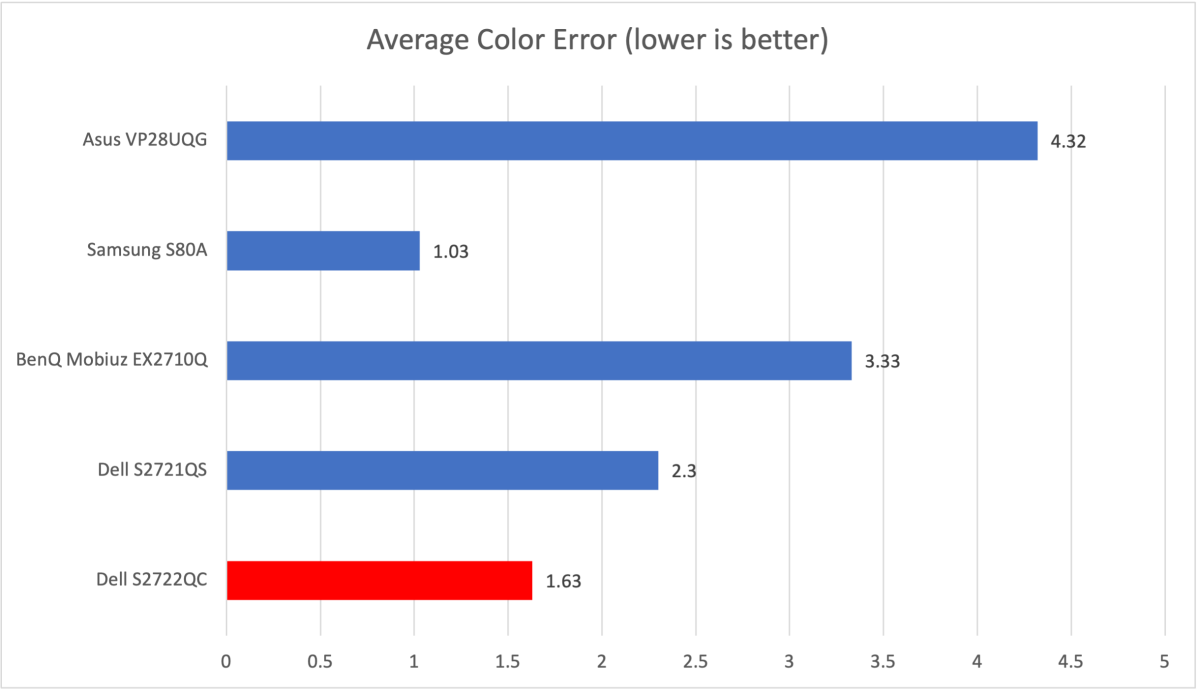
Matt Smith/IDG
Matt Smith/IDG
Matt Smith/IDG
Color accuracy is a strength for Dell. The S2722QC reached an average color error below two, which is more than adequate for day-to-day productivity, streaming, and gaming. Samsung’s more expensive S80A has a lead here, but it’s small, and I doubt most people would notice the difference.
The S2722QC posted a gamma result of 2 (off a target of 2.2) and a default color temperature of 6700K (off a target of 6500K). These are in the typical range for the category, though gamma is on the outer fringe of what’s typical. A lower gamma value generally boosts detail in bright areas but lessens it in dark areas. This may contribute to the monitor’s unfortunate contrast ratio in SDR mode.
Dell S2722QC HDR display performance testing: A real bright spot
HDR is supported, though turned off by default. You must turn it on in the monitor’s on-screen settings to make HDR available in Windows 11.
Flipping to HDR boosts maximum brightness to 417 nits and, more importantly, sends the contrast ratio soaring to 1190:1. That is a great result of a mid-range IPS monitor and a huge boon to image quality. I noticed a pleasing sense of depth that is not available in the monitor’s SDR mode. Gamma also moved towards the preferred target of 2.2. Content has a balance of detail in dark and bright areas of the image.
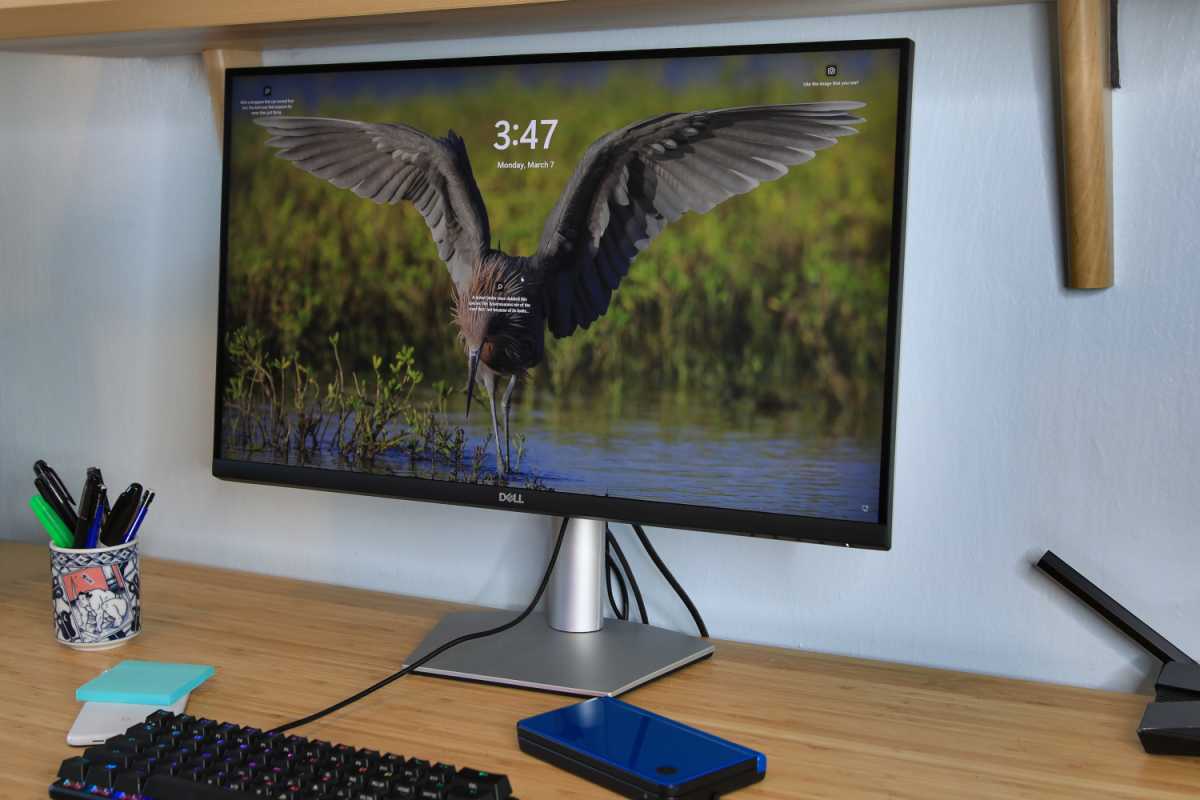
Matt Smith/IDG
Matt Smith/IDG
Matt Smith/IDG
I actually prefered to use the monitor in HDR with Windows 11’s HDR brightness slider set to about 30 percent of maximum during normal use. I’ll ramp that up to 75 percent when gaming for extra visual punch. That’s a rare compliment. Most budget and mid-range monitors that offer an HDR mode have serious issues with presentation that make HDR hard to use.
The attractive HDR mode adds vibrance in video games and streaming apps that support it. This monitor does not have dynamic backlight dimming, however, so the HDR feature is lackluster in scenes that pair large, dark areas with bright highlights, such as a starlit sky.
Dell S2722QC motion performance: AMD FreeSync at 60Hz
Sorry, gamers. The Dell S2722QC supports FreeSync, but it isn’t a great pick for gaming. The monitor has a maximum refresh rate of just 60Hz and a promised response time no better than four milliseconds.
That’s bad news for motion clarity. Compared to a 144Hz gaming monitor, the Dell S2722QC shows significant blur behind fast objects and when panning across a scene. It’s not really an issue if your favorite game is Civilization VI, but it’s annoying if you prefer Valorant.
Dell S2722QC display performance summary
The Dell S2722QC is sold as an everyday productivity monitor and it feels tuned for that purpose. A sharp 4K image, high maximum brightness, and good color accuracy make for a pleasant experience when surfing the web or editing a spreadsheet.
Entertainment is where this monitor falls behind due to its low contrast ratio in SDR mode and modest color gamut. Games and movies that don’t support HDR can look rather dull. This will be a problem if you work from home and want one monitor for both daily productivity and after hours fun.
Conclusion
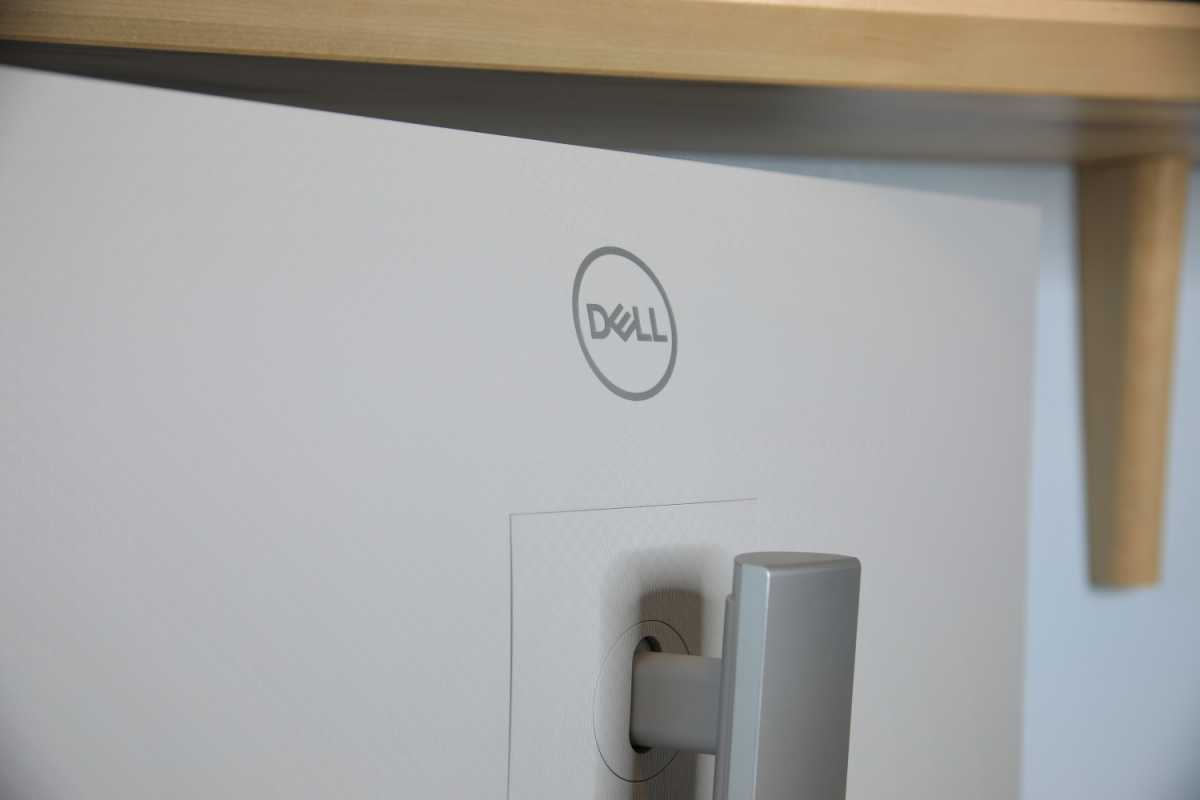
binary comment
binary comment
Matt Smith/IDG
binary comment
Matt Smith/IDG
Matt Smith/IDG
The Dell S2722QC is a monitor you should buy for its features, not its display performance. It delivers 4K, USB-C connectivity, and speakers for less than $400, providing a price advantage over the Samsung S80A and Asus ProArt PA289CV. Those alternatives have a more attractive picture but are usually at least $100 more expensive.
Image quality is where the S2722QC falters. The monitor has a sharp, bright presentation that is ideal for productivity, but the monitor’s disappointing SDR contrast ratio saps vibrance. The mediocre color gamut makes it a no-go for photographers and videographers, as well.
The key question is this: Do you need excellent image quality? Or would you be happy to sacrifice some image quality to have USB-C at a low price? Those who lean towards the latter should consider the Dell S2722QC.
Best Prices Today: Dell S2722QC
RetailerPrice
 $299.99View Deal
$299.99View Deal
Author: Matthew S. Smith
Matthew S. Smith is a freelance technology journalist with 15 years of experience reviewing consumer electronics. In addition to PCWorld, his work can be found on Wired, Ars Technica, Digital Trends, Reviewed, IGN, and Lifewire. Matthew also covers AI and the metaverse for IEEE Spectrum and runs Computer Gaming Yesterday, a YouTube channel devoted to PC gaming history.
Recent stories by Matthew S. Smith:
Best monitor arms 2024: The ultimate in flexibilityPixio PX248 Wave review: A monitor for fashion, flair, and clarity on a budgetBest portable monitors 2024: Displays that go with you




